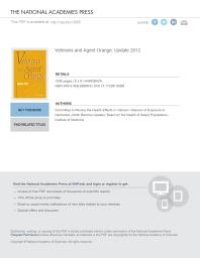
Ebook: Veterans and Agent Orange: Update 2012
Author: Institute of Medicine, Board on the Health of Select Populations, Committee to Review the Health Effects in Vietnam Veterans of Exposure to Herbicides (Ninth Biennial Update)
- Tags: MED000000, MED022000
- Year: 2014
- Publisher: National Academies Press
- City: Washington, D.C., United States
- Edition: 1
- Language: English
- epub
From 1962 to 1971, the US military sprayed herbicides over Vietnam to strip the thick jungle canopy that could conceal opposition forces, to destroy crops that those forces might depend on, and to clear tall grasses and bushes from the perimeters of US base camps and outlying fire-support bases. Mixtures of 2,4-dichlorophenoxyacetic acid (2,4-D), 2,4,5-trichlorophenoxyacetic acid (2,4,5-T), picloram, and cacodylic acid made up the bulk of the herbicides sprayed. The main chemical mixture sprayed was Agent Orange, a 50:50 mixture of 2,4-D and 2,4,5-T. At the time of the spraying, 2,3,7,8-tetrachlorodibenzo-p-dioxin (TCDD), the most toxic form of dioxin, was an unintended contaminant generated during the production of 2,4,5-T and so was present in Agent Orange and some other formulations sprayed in Vietnam. Because of complaints from returning Vietnam veterans about their own health and that of their children combined with emerging toxicologic evidence of adverse effects of phenoxy herbicides and TCDD, the National Academy of Sciences (NAS) was asked to perform a comprehensive evaluation of scientific and medical information regarding the health effects of exposure to Agent Orange, other herbicides used in Vietnam, and the various components of those herbicides, including TCDD. Updated evaluations are conducted every two years to review newly available literature and draw conclusions from the overall evidence.Veterans and Agent Orange: Update 2012 reviews peer-reviewed scientific reports concerning associations between health outcomes and exposure to TCDD and other chemicals in the herbicides used in Vietnam that were published in October 2010-September 2012 and integrates this information with the previously established evidence database. This report considers whether a statistical association with herbicide exposure exists, taking into account the strength of the scientific evidence and the appropriateness of the statistical and epidemiological methods used to detect the association; the increased risk of disease among those exposed to herbicides during service in the Republic of Vietnam during the Vietnam era; and whether there exists a plausible biological mechanism or other evidence of a causal relationship between herbicide exposure and the disease.
Download the book Veterans and Agent Orange: Update 2012 for free or read online
Continue reading on any device:

Last viewed books
Related books
{related-news}
Comments (0)